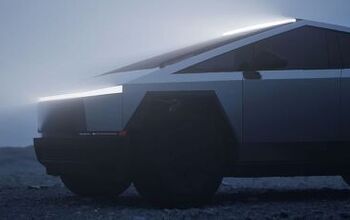A New Alliance? Volkswagen and Ford In Talks to Share U.S. Plants

Months of speculation fueled by the increasingly chummy relationship between Ford and Volkswagen has given way to new possibilities. The two partners, who signed a Memorandum of Understanding earlier this year, might leap further into bed than initially thought.
To hear VW CEO Herbert Diess tell it, the two automakers might soon share American assembly space. And can Tennessee expect a new plant? It’s on the table.
Diess was in Washington D.C. this week for a White House meeting. Stopping to speak with assembled media, Diess claimed the German company was (quite eagerly, it seems) building an alliance with its American partner.
“We are in quite advanced negotiations and dialog with Ford Corporation to really build up a global automotive alliance, which also would strengthen the American automotive industry,” Diess told Reuters, adding that his company was considering building a second assembly plant in the United States.
An alliance could result in VW building cars in underutilized Ford factories, he said.
“We are building an alliance with Ford which will strengthen Ford’s position in Europe because we will share platforms,” Diess commented. “We might use Ford capacity here in the U.S. to build cars for us.”
Unlike the Renault-Nissan Alliance, this one wouldn’t see VW take a stake in the other company. Rather, it would be all about product and capacity.
When reporters in Detroit questioned Bill Ford Jr. about Diess’ remarks, the Ford chairman replied that talks with VW were going “very well,” though he remained much more tight-lipped than his German counterpart. Asked about the possibility of joint products or shared production space, Ford said the two “haven’t gotten that granular in our talks yet.”
Earlier remarks by VW execs and company sources suggested the main goal for the two companies was the production of light commercial vehicles in Europe. That eventually migrated to the possibility of jointly developed models, or perhaps platform swaps, in other segments. VW is apparently quite interested in Ford’s midsize Ranger pickup, while the company’s MEB electric platform could prove quite useful to Ford.
As for a second VW plant, Diess said the company is in “quite advanced negotiations in Tennessee but there might be other options as well.” Currently, the automaker’s Chattanooga assembly plant isn’t running at capacity, though new products are likely on the way. They include a shorter, sportier version of the Atlas, an Atlas-based pickup, and MEB-platform I.D. models.
If you’re thinking all of this talk of boosted U.S. VW production, accomplished in whatever way possible, is a good way to insulate VW from possible tariffs on European vehicles, well, you’re not alone.
“That’s basically why we are here, to avoid the additional tariffs, and I think we’re in a good way,” Diess told Bloomberg outside the White House.
[Image: Ford Motor Company]

More by Steph Willems
Latest Car Reviews
Read moreLatest Product Reviews
Read moreRecent Comments
- VoGhost Great to see leadership from Washington in supporting American businesses and job creation.
- VoGhost Oh, Mattie, I am BEGGING you to take a course in economics. There's probably a community college near you offering courses for free or very cheap. Seriously, people this ignorant of basic economics really should not be writing this drivel. Stick to what you know: pimping for big oil.
- 2manyvettes I was a computer instructor in a local technical college for some years teaching Windows OS and Micosoft Office. Not long before I retired I purchased a Mac Book Air laptop. It didn't take me long to learn the Apple OS and the first thing I learned was the lousy job Microsoft did ripping off the Apple software. I purchased Microsoft Office for Apple at the time and discovered when Apple upgraded the OS to 64 bit and my 32 bit Office software would no longer run on the laptop, that embedded in the Apple OS was software that could open any Office file and could save any file in Microsoft file format. I have always felt if Apple sold product at PC prices they would put Microsoft out of business. Oh, and I bought my Mac ten years ago and still runs like brand new. Effect on Rivian? Who knows? Based on my experience with their technology, it could be interesting.
- Spectator This was an amazing vehicle. Back then Acura knew how to make a plush and comfy seat!
- Syke F1 fan and normally watch every race, although most of them are DVR'd. I've got my Xfinity box set up to record everything automatically. This past Sunday I watched the race live for a change.


































Comments
Join the conversation
I'm scratching my head on this one. For years, we've been told there is overcapacity in the US. GM's recent announcement reinforces this idea. I don't recall Ford closing as many plants in the last 8-10 years as GM, but they didn't have as many to start with. VW has a middling market share in the US, I think the Golf/Jetta is the only car that really generates good sales numbers. Are the Atlas and Tiguan really that much in demand? I have a hard time seeing where VW needs the capacity (unless it's strictly for the proposed van production). VW is essentially outsourcing it's new product here in the US, which is kind of odd. Considering they have huge investments in Mexico, I would imagine it would be cheaper to produce there.
Tennessee, my arse. I hear there are some fine GM plants up in Michigan just waiting for a new owner.